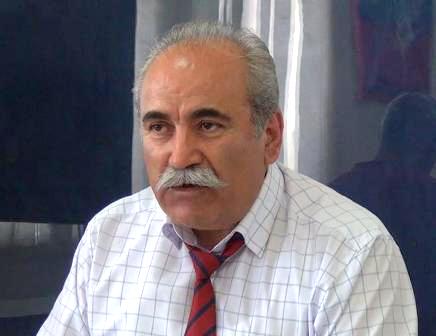 We, the undersigned members of the Armenia-EU Parliamentary Partnership Committee, express deep disappointment by the unconstructive and biased stance as well as harmful and misleading statement issued by three Members of the European Parliament, namely Mrs. Marina Kaljurand, the Co-Chair of the EU-Armenia Parliamentary Partnership Committee, Mr. Traian Basescu, Standing Rapporteur on Armenia and Mrs. Zeljana Zovko, Standing rapporteur on Azerbaijan that would undoubtedly have a damaging impact on our mutual engagement.
We, the undersigned members of the Armenia-EU Parliamentary Partnership Committee, express deep disappointment by the unconstructive and biased stance as well as harmful and misleading statement issued by three Members of the European Parliament, namely Mrs. Marina Kaljurand, the Co-Chair of the EU-Armenia Parliamentary Partnership Committee, Mr. Traian Basescu, Standing Rapporteur on Armenia and Mrs. Zeljana Zovko, Standing rapporteur on Azerbaijan that would undoubtedly have a damaging impact on our mutual engagement.
We have always treated the EU-Armenia Parliamentary Partnership Committee for its face value, namely as a platform where true partners can discuss all issues of concern. The Article 365 of the Comprehensive and Enhanced Partnership Agreement, which is a guiding legal basis of our relations with the EU clearly stipulates, that the EU-Armenia Parliamentary Partnership Committee “ shall be a forum … to meet and exchange views”. Bilateral parliamentary committees are not platforms for conflict resolutions or mediating formats and are aimed at developing mutually beneficial and effective parliamentary partnership and cooperation on the one hand between the EU and Armenia and on the other hand between the EU and Azerbaijan bilaterally and not one at the expense of the other.
This statement, published by the above-mentioned authors, raises serious concerns over credibility, integrity and competence of their authors.
They have chosen to forfeit the important cooperation and discussion platform and have misused their official positions as Co-Chair and rapporteurs by issuing this controversial statement.
On one hand, the statement reiterates “unwavering support to the efforts of the Co-Chairs of the OSCE Minsk Group and their 2009 Basic Principles” and on the other hand shamefully distorts the very essence of basic principles.
Twice in the statement the terms “occupied” and “occupation” are used for the territory of Nagorno-Karabakh. The authors should know, however, that the OSCE Minsk Group Co-Chairs do not deem Nagorno-Karabakh or any other territory, for that matter, as an occupied area. In none of their statements, including those done on the level of Head of States, is Nagorno-Karabakh defined as “occupied”. Thus, calling Nagorno-Karabakh “occupied” by no means falls in line with the mediating efforts of the OSCE Minsk Group Co-Chairs and that’s not a position of the European Parliament, the European Union and pan-European organizations.
We would like to stress the fact that the very last phrase of the statement is also a position propagated only by the Azerbaijani side, which likes to repeat that the resolution of the conflict should be “within the internationally recognised borders of Azerbaijan.” This sentence per se is against the very logic of the three decades long peace process. The 2009 Basic Principles and elements outlined by the OSCE MG Co-Chairs do not predetermine the results of the negotiations (something the statement clearly purports). To the contrary, it stems from the Basic Principles, to which the authors are referring to, that the final status of Nagorno-Karabakh shall be determined through a legally binding free expression of the will of the people of Nagorno-Karabakh.
In this light, such an expression of “unwavering support” towards the co-chairs and the basic principles is highly unsubstantiated and self-contradictory.
We also took note of the subsequent explanation of Ms. Kaljurand provided to the Armenian side of the PPC, according to which, the phrase “peaceful resolution of the conflict within the internationally recognised borders of Azerbaijan” used in the statement “does not refer to the current internationally recognized borders of Azerbaijan, but instead to any other future borders of Azerbaijan, which may be internationally recognized after an agreement is reached.”
For us, the substance of the provided explanation regarding the statement clearly indicates that the authors of the statement are in no position to make competent comments on this complex peace process, and its basic principles.
What makes this statement even more unacceptable is the timing and the fact that it was issued amid the recent bellicose statements coming from the President and Defense Minister of Azerbaijan threatening to unleash a new war. It is important to note that such statements might be used by the undemocratic and warmongering officials of Azerbaijan as a permission and cover up to use force and unleash military aggression against the people of Nagorno-Karabakh. Those who support claims of Azerbaijan in dehumanizing people of Nagorno-Karabakh share responsibility for undermining regional security and will be complicit in any future aggression in the region.
We also consider as highly dubious the topic which has been used as a pretext to issue this statement. We believe that the real aim of the authors of the statement has been to insert one-sided stance regarding the resolution of the Nagorno-Karabakh conflict. This is something that Azerbaijan has always tried and failed within the OSCE Minsk Group Co-Chairmanship.
We also wish to note that, before being concerned by a highway construction there are many issues that require a reaction from our partners and could potentially save peoples’ lives. Building a road that aims to provide basic infrastructure to people, who have human rights regardless of the political status of their territory cannot be considered more dangerous than threats of a leader of an autocratic regime to wage an imminent war in the region or the ongoing crackdown on human rights in Azerbaijan itself in the time of pandemic, something that was brought forward by the Rapporteurs of the Parliamentary Assembly of the Council of Europe. The desire of the people of Nagorno-Karabakh to have basic communications stems from their basic human rights and can pose no danger to regional and international security.
The stance of Mr. Traian Basescu, Standing Rapporteur on Armenia, who is known for very close and awarded ties with the highest leadership of Azerbaijan and his previous controversial remarks on Armenians in Romania, is very concerning as it indicates that Mr. Traian Basescu has been unable to stand above his previous engagements and to approach his current duties in good faith and integrity.
Taking into consideration the abovementioned, we reiterate our clear and unequivocal rejection of the statement made by Mrs. Marina Kaljurand, Mr. Traian Basescu and Mrs. Zeljana Zovko and express deep concern regarding the practice of issuing one-sided and biased statements with unacceptable formulations as well as of using their respective positions for displaying personal views.
In this light, the Armenian delegation to PPC reserves the right to reassess and review accordingly any future engagement with Mrs. Marina Kaljurand, Mr. Traian Basescu and Mrs. Zeljana Zovko in their respective capacities.
At the same time, we want to reiterate the importance of our partnership and continued engagement with the EU in the dimension of parliamentary cooperation.
Members of the Armenian-EU Parliamentary Partnership Group
Yeghoyan Arman “My step” faction, (Head)
Abovyan Arman “Prosperous Armenia” faction
Gabrielyan Sisak “My step” faction
Galstyan Meri “My step” faction
Grigoryan Hripsime “My step” faction
Khachatryan Arkadi “Bright Armenia” faction
Khandanyan Sargis “My step” faction
Rubinyan Ruben “My step” faction
Tonoyan Iveta “Prosperous Armenia” faction
Yengibaryan Viktor “My step” faction







